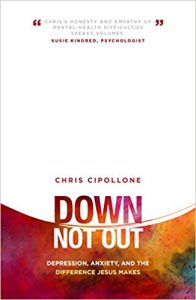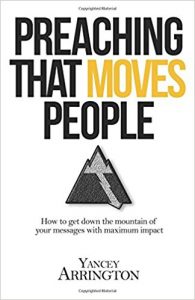Proclaimer Blog
Sherbornes with Pamber – Cornhill Missions 1/7
The Core (final year) Cornhill Students recently went on Missions mostly in the UK but also overseas. It is a chance for them to experience different ministry contexts and be blessed by a local church congregation and be a blessing to them in return. We asked the mission teams to write a short report about what they got up to.

Our time at Sherbornes with Pamber (just north of Basingstoke) was filled with a wide variety of events, both big and small, where we were able to speak of Jesus and share the gospel, under the theme of Hope in a Hopeless World.

We enjoyed being put on the spot during the question time at the local primary school, and later that evening at the event in the local pub. Some of us visited a local care home, whilst others joined the Mum’s and Young Children for the afternoon tea. Over the weekend, there were parties for all the children and youth that we were able to join in with. Saturday morning was spent helping at a men’s breakfast, followed by a women’s coffee morning and finished with a Saturday night quiz. Our Cornhill team ran the entire Sunday morning service and this was followed by a bring-and-share lunch.

It was great to be able to encourage the church in proclaiming the gospel and living for Jesus, and for ourselves to be encouraged by the ways that Sherbornes with Pamber is going this. It was also a great reminder that we do not always have time to prepare an answer, but can always give the reason for the hope that we have when asked.
by Kirsten Parker
Please pray for Sherbornes with Pamber and also for our Core Students as they consider their next steps after the summer.
If you are interested in applying to Cornhill for Sept 2018, then please click here.
Proclaimer Blog
Down not Out – [Chris Cipollone]
Here is a book written not by a Psychologist but by a sufferer – a Christian sufferer. Cipollone is a Christian Minister who has experienced and continues to live with anxiety and depression. Chris uses his personal story to walk the reader through the process of understanding and addressing the multi-faceted nature of mental illness. He asks the hard questions that every sufferer and their carers ask. He tackles openly and honestly the issues that are sometimes taboo: Brokenness; feelings; attack; idols; suicide; healing and more.
Whilst Cipollone shamelessly shares his own story, at each point he also speaks God’s Word of truth into each situation. This is not a book that revolves around the author, it is a book that points to Jesus and reminds the reader of their Identity in Him. This is not done in a heavy, preachy way, but with accessible sensitivity and compassion. Cipollone carefully draws on passages from a variety of biblical genres to provide teaching, correction, empathy, encouragement and hope. By dividing this short book into small bitesize chunks with one word titles, the author has made this book an easy read for the person already feeling “down”. He clearly understands the limited capacity of the sufferer and the need to speak eternal bitesize truths into a particular moment in time.
As someone prone to having “downs”, I found this book extremely helpful. It is honest and real about how bad it feels and yet uncompromising in speaking the truth of the gospel of Jesus. This is what we all need and Cipollone does this with empathy and grace.

The brevity of the book does mean that there is a danger of a lack of depth. This can be read all too speedily and then quickly forgotten. However, each chapter ends with “Reflection” which no doubt aims to slow the reader down and digest each bite.
If you are looking for a more clinical book with definitions, causes, symptoms and treatments – look elsewhere. This is a book for a Christian sufferer and those who love them and who want to better understand how the great gospel of Jesus speaks mightily but gently into the hearts of those with a broken mind.
by Rebekah Brown
Reading level: Very accessible and easy to read.
Price: RRP £7.99
ISBN: 9781784981419
Publisher: The Good Book Company
Rating: *****
Proclaimer Blog
Preacher’s Profile [Nigel Styles]
This is the fifth in our Preacher’s Profile Series. This time we asked Nigel Styles, the PT Director of Cornhill some questions about his life and preaching ministry.
 Since April 2016, Nigel has been Director of the Cornhill Training Course in London. Previously, he was involved in church leadership for over 35 years, most recently as Senior Minster of Emmanuel Church Bramcote, Nottingham. He is enthusiastic to hear the Bible taught well and loves watching its impact in people’s lives.
Since April 2016, Nigel has been Director of the Cornhill Training Course in London. Previously, he was involved in church leadership for over 35 years, most recently as Senior Minster of Emmanuel Church Bramcote, Nottingham. He is enthusiastic to hear the Bible taught well and loves watching its impact in people’s lives.
Nigel is married to Lizzie, and they have six children and nine grandchildren. He loves music, theatre and contemporary fiction. Nigel wishes he’d been a Blue Peter presenter.
1) When did you preach your first sermon and how long have you been preaching?
I don’t remember my first sermon, but I do remember my first sermon in front of Dick Lucas. It was in a preaching group at one of the very earliest Proclamation Trust conferences at Fairmile Court. My ‘gobbett’ was 1 Corinthians 10:12-13. I had no idea what I was doing and cobbled something together from the Tyndale commentary. My two points were: ‘1. this is a warning’ and ‘2. this is an encouragement’. Dick’s single comment at the end was ‘Well, I think you’ve got to decide which it is, brother’. Brilliantly incisive!

2) What was your journey to preaching ministry?
After working as an actor in a Christian Theatre company, and then as a Music Director in a local church, I ended up at that Fairmile Court preaching conference. It was the first time someone had taught me how to be able to understand the Bible and teach it to others. It was exhilarating. After some years working at St Helens Bishopsgate, I grew in conviction about the powerful effectiveness of God’s word and that I wanted to give my life to teach it to others.
3) Describe the congregation/setting you regularly preach to.
In my role at Cornhill, I’m ‘on my feet’ with Bible in hand most days. But my preaching is mostly now as a visiting preacher (- I prefer church weekends to a single sermon), and sometimes at the home church we attend as a family.

4) What are you currently preaching on/through?
I’ve always tried to have ‘a Book of the Year’. In local church ministry, I obviously was preaching from more than one Bible book over the course of a year, but I tried to have one Bible book that I’d keep coming back to, and that I’d preach from whenever I had the chance. In my role now, that’s much easier to maintain. It’s been Daniel for the last 18 months. And I’m just moving on to 2 Timothy.
5) What is your regular rhythm of sermon preparation, your usual process and how you schedule it in during the week?
I aim to get ahead with my ‘Book of the Year’ by reading it in personal quiet times, or going through it at church staff meetings about 6-18 months ahead. Then I give some good time to ‘overview’ the whole book during the quieter summer months (as a preview for the new academic year). I use an A5 notebook and, in the first section of that book, write up anything and everything I discover. I’d aim to end that initial overview with three things clear: some sense of the ‘Melodic Line’ of the book (ie main subject), the pastoral intention of the author (ie purpose), and sections for preaching it. (I break all my own rules, and read commentaries at this early stage … and always read at least two or three!)
Then I divide the rest of my notebook into those preaching sections. When I come to preach on that particular passage, I’ve already got some clear sense of what the whole book is about and this passage fits in. In a regular, preaching-every-week pattern, I spend the first part of the week taking the passage apart and using all kinds of techniques to make me read slowly. ‘Teaching people to read’ is one of the first things we do at Cornhill! Jotting down all these prep notes in a notebook means that I have a record of my Bible ‘text work’ that I can use again in the longer term future.
I’d aim (by Wednesday) to have a draft sermon outline with Theme Sentence, Aim Sentence, headings and (most importantly) the logic of what I’m seeking to persuade people from this Bible passage. I handwrite all that onto a single side of A4.
And then immediately, at this early point, I begin to compile a script. I type onto A5 (portrait), using Verdana 12pt (ie quite large font, so I don’t need my glasses to read in the pulpit!). I start each new sentence on a new line, and I know that if any line continues into a second line, it is too long. I leave lots of space on the pages of my notes to show me where to add fuller explanation, illustration, application, etc. During the rest of the week, I’ll add to those notes. I keep re-writing sentences/phrases. I want to be as colloquial as possible, rich in word pictures, checking that there’s a rhythm to my phrases. I’m on the look out for anything that might be useful, from TV, reading, news, chats with people, road signs, conversation overheard on a bus … Yes, anything!
That script with its later additions and scribblings is what I take into the pulpit with me:
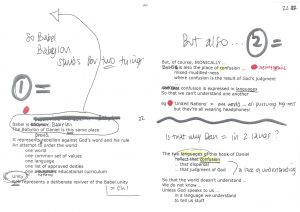
8) What is your routine before preaching on a Sunday?
I’d normally get up very early to have lots of time to read through my notes – not simply so that I’m familiar with them, but so that I’m really clear about the simple, simple message. I could preach that with no notes (if I had to … but I’d never choose that option!). I want to pray myself into the text and into the people I’ll be speaking to.

9) What feedback structures do you utilise in improving on your preaching?
Nothing beats the regular feedback from a church staff – people I know and love, and who I know are absolutely committed to my good. My regular pattern was that the first 15-20mins in the weekly staff meeting would review the previous Sunday’s sermon.
The next best thing to that is giving feedback to others, because that keeps me analysing what makes good preaching.
10) What areas are you currently seeking to develop in your preaching?
I want to be simpler. The main thing I notice when I look back at sermons I preached some years ago is that my sermons now are less jam-packed with ideas. I think congregations need to be told less to hear more. I always remember the advice of John Chapman: a book contains the maximum number of ideas in the minimum number of words … and a sermon is the exact opposite: the minimum number of ideas in the maximum number of words.
And that is my main piece of advice to younger preachers.

11) What do you do on the days your preaching did not go very well?
Someone told me that the loneliest place on earth is the bottom of the pulpit steps, immediately before and after preaching. That’s certainly my experience. I am absolutely exhausted after I’ve preached. Talking to people at the end of the service is hard work … but it is essential, so I simply won’t let myself run away (however much I might want to!). And in that ‘down in the dumps’ feel at home afterwards, I simply give myself a talking to: ‘Did you, to the best of your ability, tell people what the Bible says and means? Is the Bible powerful? Well, trust God and go to bed. Tomorrow is another day.’

Proclaimer Blog
Preaching that Moves People [Yancey Arrington]
Preaching is like skiing…

This new book from Yancey Arrington, teaching pastor at Clear Creek Community Church in Houston, is a fresh, clear and well written book on the delivery of a sermon.
It is a preaching book with a difference. It is not a book on the content of sermons, it is a book about the presentation and communication of sermons. This is definitely a weakness, we teach people well about the science of preaching, but are less strong on teaching people the art of preaching.
Yancey’s sneaking suspicion is that most sermons delivered in pulpits on Sunday are really lectures in disguise.
“My hope is that you will use this book to develop your delivery so you are more apt, by God’s grace, to preach in a way that moves people.”
Yancey is clear that this is not manipulative emotionalism , nor is it mere pragmatism. Yancey wants people to think hard about not just what goes into the sermon but how to arrange, deliver and use the treasure unearthed by careful exegesis and prayerful study, in a way that gives the greatest potential to make the greatest impact in the minds and hearts of the hearers.
The basic metaphor used throughout the book is that preaching is skiing, or more particularly it is like being a skiing guide. It is about getting the congregation down the mountain in a way that both showcases the Bible passage in the best possible way, but also is well paced, rightly stretching and exhilarating.
It is a basic 3-point plan.
- Arrange for Tension
- Build for Speed
- Chart for Bandwidth
It is very thought provoking material and whilst you won’t agree with every paragraph, insight or observation, it is an opportunity to reflect and think about your preaching.
I think the skiing metaphor is really helpful and gives a great picture to help people reflect and give feedback on sermons. I loved the chapter on Arrange for Tension (2), with the premise that Tension = Attention, and reflecting wonder if I give ‘spoilers’ too early in my sermon which gives the game away too early.
I think this book is particular helpful for the seasoned preacher who has been delivering sermon for a while, I think it helps identify the ruts we have retreated into and reflect on how we can preach more fruitfully.
This book will not help with the what of preaching, but it will definitely sharpen you in the realm of the how of preaching.
Useful for: Anyone who preaches, but particularly those who have been doing it for a while.
Reading level: Very accessible and easy to read.
Price: RRP £11.25
ISBN: 997946903
Publisher: Clear Creek Resources
Rating: *****
Proclaimer Blog
Wednesday is for Women’s Ministry (Part 4)

Carrie Sandom is the Director of Women’s Ministry at The Proclamation Trust. I asked her a few questions about Women’s Ministry.
Here is part 4 of our 4 part series, Wednesday is for Women’s Ministry.
How can pastors better encourage gifted women in their churches?
First of all by seeing the need and having a vision for women’s ministry in the local church – and then secondly by spotting who the gifted women are! I would never have got into ministry if it hadn’t been for the senior minister who heard me teach in the Sunday school and encouraged me to get some training. I reckon there are many church families who have under-used godly and gifted women in them! Encouraging women to get involved in one to one Bible studies, teaching at a women’s breakfast or leading at a Christian summer house-party is a great way for them to test the water and, crucially, to get some constructive feedback from those who hear them teach the Bible. Then they can mobilise other women in the church by getting them doing one to ones with other women.
It’s not rocket science – all you need for really fruitful women’s ministry is an open Bible and a cup of tea! For those who want to take things further, there are many more training opportunities for women than there used to be (through the regional ministry training courses, Cornhill, and the Oak Hill youth and children’s course to name but a few).
How should keen women investigate pursuing a ministry role amongst women?
The key thing, first of all, is to talk to people in the home church who know them well and have heard them teach the Bible in some context – this should at some point include the senior minister of their church. When women talk to me I tell I’m looking for three things – character (are they godly and known to be godly); convictions (do they hold firmly to the teaching of the Bible); and competence (are they able to teach the Bible with clarity and winsomeness).
Secondly, they should get on and serve where they are in some way (if they’re not already). Too many women think they need a title or a recognised position in the church before they do Word ministry. They don’t! It’s often the ones who are already studying the Bible one to one or leading in the Sunday School or leading a women’s group who are best suited for this work.
Thirdly, they should think about getting some extra training – may be a one day a week regional training course or a ministry apprenticeship (not just for gap year graduates) or something like Cornhill. And if they have the time and opportunity I always encourage women to think about getting some theological training as well. The investment of two or three years of full time study will never be wasted – however people sue it afterwards.

What resources would you point someone to if they wanted to be better equipped for women’s ministry?
Women’s ministry is about teaching the Bible to women NOT teaching women’s issues to women! At some point you will need to consider the role of women in the family and the church and how women’s ministry works out in the local church but it’s God’s Word that sets the agenda in women’s ministry – just as it does in any other Bible teaching ministry. To that end the resources people need are good Bible handling skills, which is what we’re aiming to give to women at Cornhill. Many of the gospel partnerships have Ministry Training Courses that people can access (usually one day a week during term-time). Some also run Saturday morning and/or evening courses for those who aren’t available during the day. For those who don’t have time for a weekly course, the Equipped online resource is proving very popular – which can be accessed via the PT website and is suitable for groups or individuals. The PT Media books are also very user friendly and a good place to start if people want to work their way through a Bible book either on their own or with a group.

You have travelled extensively teaching the Bible to women in different circumstances and settings. How do you think the UK church is doing compared to other countries in the realm of Women’s Ministry?
We’re doing okay but there is room for improvement. Lots of women are being trained through the regional ministry training courses but only a very few go onto theological college. The Australians are way ahead of us on that front. We are better at networking across the denominational divide than we have been in the past but we do not have the same networks or resources as the Americans. I think the Brits are just a bit too cautious with each other sometimes! And as for the South Africans – they seem to have so little in the way of financial resources but their churches are growing and they seem to be the most joyful of all of us!

Proclaimer Blog
Women in Ministry 2018 [Alice Cornes]
Alice Cornes works for St Philemon’s Church, Toxteth, Liverpool.
The first thing I did when I came home from the PT Women in Ministry conference was to put the dates of the 2019 conference into my diary!
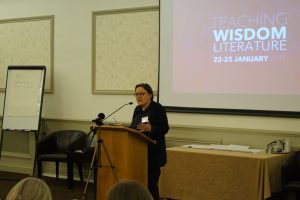
The second thing was to bound in to the room of my just-finished-night-shifts flatmate announcing ‘Jesus is wonderful in Psalm 45! Can I show it to you?!’ The poor girl then sat through my rendition of the psalm, in the song we’d learnt on the conference. All 4 very long verses of it. My timing may not have been thoughtful, but I did come home with my heart full of Jesus.
We were thinking about how to handle Wisdom Literature this year. Soaking it in for ourselves, and learning how to teach it back in our church families. The workshop groups were useful for that. Most of us don’t get much feedback on the Bible teaching we do through the year but we want to get sharper. So it’s wonderful to have a group of women who’ll listen to me teach a bit of the Bible and then gently show me what my strengths are and what I can work on. I came away challenged to use NT controls better (commentaries are my friends, I’m told!) and buoyed by their encouragement that I am able to teach.
The main teaching sessions this year were taught by Robin Weekes (Minister of Emmanuel Wimbledon) teaching us from the Psalms and Jenny Salt (Dean of Students, Sydney Missionary & Bible College) teaching us from Ecclesiastes.


It’s a joy to have time talking with other women there. It stretches my outlook when I talk to women’s workers, children and youth workers, people teaching the Bible part-time or in their free time when they’re not at work, missionaries based in Slovakia or Jordan, women with years of experience and women who are just starting out, the whole gamut. This year it struck me what a useful part of the conference that is. We all need encouragement, some of us particularly strongly when we’re close to giving up. For a number of women I spoke to, the conference was a key time for gaining direction on what next. For me, it was a great time for stealing other people’s ideas for events, models of ministry, ways to make ministry sustainable etc. These conferences are a great combination of equipping, encouragement and being re-energised to better serve the Lord Jesus.

There was time to rest, too. I’m not very good at resting and I’m especially bad at the kind of rest that actively engages with God. I’m more likely to knock around a squash ball than to chew the cud with my Father. The conference was super for both! Good food, lots of time to sleep, and walks in the countryside, but also lots of breaks between one bit of Bible teaching and another, when my head is full of Christ and there’s space to speak to him. I was grateful for time talking through my fear of man with him.
When you dunk a sponge in water, and then walk with it across the kitchen, the floor is bound to get splashed. The conference felt like dunking us for 3 days in superb teaching and useful conversations. I hope, now I’m home, the people around me will get splashed!
Next year’s Women in Ministry conference is 21st-24th January at Hothorpe Hall, near Market Harborough. In 2019 we will be thinking about Apocalyptic Literature with Nigel Styles (Cornhill Director) and Andrea Trevenna (Associate for Women’s Ministry at St. Nicholas Church, Sevenoaks).
To book on to Women in Ministry 2019 click here.
Proclaimer Blog
Music from Women in Ministry 2018
There were many requests regarding the songs that we sung at WiM ’18. Below find a list of all the songs from all the main sessions
Monday (5pm)
Who has held the oceans in his hands (Behold our God) | Who O Lord could save themselves (You alone can rescue) | Jesus let me meet you in your word (Now in reverence and awe) | In Christ Alone
Monday (8pm)
Come people of the Risen King | Make the book live to me | Come thou fount of every blessing | Praise my soul the King of Heaven
Tuesday (morn)
Blessed be your name (Blessed be the name of the Lord) | My soul finds rest | When I was lost (There is a new song) | Your glorious cause (Let your Kingdom come)
Tuesday (eve)
The splendour of the King | To God be the glory | There is a hope (that burns within my heart)
Wednesday (morn)
Crown him with many crowns | Jerusalem (See Him in Jerusalem) | Prepare our heart O God | Psalm 45 – O King you are most worthy (Matt Searles Lyrics, to the tune Thaxted – I vow to thee my country)
Thursday (morn)
Before the throne of God above | I once was lost in darkest night (All I have is Christ) | Be thou my vision
We hope that this is helpful…
Proclaimer Blog
Wednesday is for Women’s Ministry (Part 3)

Carrie Sandom is the Director of Women’s Ministry at The Proclamation Trust. I asked her a few questions about Women’s Ministry.
Here is part 3 of our 4 part series, Wednesday is for Women’s Ministry.
What fruit is borne through Biblical Women’s Ministry in the life of the church?
Titus 2 is clear that where this kind of ministry is NOT happening, we malign God’s Word. I take that to mean that a healthy local church will have discipleship programmes running for men and women and we adorn the gospel of grace and make it attractive when we make these a priority.

Men and women are equal in status, dignity and humanity – so why wouldn’t we take the discipleship of women as seriously as we do the discipleship of men. People have often said to me over the years that it’s a real shame that I “only” teach women but by saying this they show they do not value women or women’s ministry as much as men. This kind of inherent misogyny is rightly being challenged in our culture and the church should be leading the way in addressing the unhealthy attitudes that prevail. We malign God’s Word and the gospel of grace if we don’t.
How could a church wanting to expand and develop women’s ministry set about finding someone to fill a ministry role?
There is a growing network of women involved in ministry – either because they have done Cornhill or attend the Women in Ministry conference (or both). Evangelicals Now and the Hub are good places to advertise for jobs but it’s also worth contacting the PT office as we often know who’s looking for a job/coming to the end of their current contract.
How do you ensure women’s ministry is not the thin end of the egalitarian wedge?
I think some churches do fear this but I think doing nothing is more likely to exasperate the women in your church! Once women have a taste of what women to women ministry involves it can help them to feel valued and that they have a role to play in the life of the church. It’s helpful if the men in leadership are aware of and affirm what they’re doing and show people what an integral part of the church’s life and witness it is. But running a women’s ministry doesn’t mean I’m going to get into the pulpit! At some point the church will need to be taught about the roles of men and women in the family and the church (but not endlessly) – and then to get on and model the unique roles that men and women have.
How do you ensure that others on the pastoral team understand and support you in your role?
There needs to be good communication about what women’s ministry is and what it’s not – not just amongst the staff team but the wider church as well! The aims of the women’s ministry at St John’s are exactly the same as the aims of the church as a whole – to know Jesus better and to make Him better known. It is a Bible teaching ministry, where we let the Bible set the agenda (studying whole books at a time in the women’s Bible study groups) and not an issue based ministry (seeking to solve people’s problems). As such it is no different to what the youth worker is trying to do with the youth, the men’s worker is trying to do with the men or the preachers are trying to do with the whole church when we gather together on a Sunday.

Proclaimer Blog
Preacher’s Profile Vaughan Roberts
This is the fourth in our Preachers Profile Series. This time we asked Vaughan Roberts questions about his life and preaching ministry.

 Vaughan Roberts studied law at Cambridge University before a brief spell in South Africa where he was involved in student ministry. He subsequently trained for Anglican ministry at Wycliffe Hall, Oxford, and since 1991 he has been on the staff of St Ebbe’s Church, Oxford, where he is now Rector. Vaughan is Chairman of The Proclamation Trust.
Vaughan Roberts studied law at Cambridge University before a brief spell in South Africa where he was involved in student ministry. He subsequently trained for Anglican ministry at Wycliffe Hall, Oxford, and since 1991 he has been on the staff of St Ebbe’s Church, Oxford, where he is now Rector. Vaughan is Chairman of The Proclamation Trust.
1) When did you preach your first sermon and how long have you been preaching?
My first sermon was in my second year as an undergraduate at Cambridge when I spoke to a very small congregation consisting of about 10 elderly people. It was on Genesis 12, a key passage for biblical theology – but I completely missed that point. I was on crutches after a football injury and had to sit to speak, which made it even harder to engage the congregation and keep them awake. I failed! That was in 1986, so I’ve been preaching for over 30 years.
2) What was your journey to preaching ministry?
As a very young Christian I was given tapes of Dick Lucas on Colossians. I had never heard of him at the time, having no experience of evangelical churches, but I found them electric and remember thinking: I’d love to give my life to preach the Bible like that. But I was very shy as a teenager and didn’t think that I would ever be given opportunities to speak in public. But within a couple of years I was asked to give talks to school Christian groups and at camps for teenagers. That’s a great context in which to learn to speak, as you have to work hard to engage them – teenagers make little effort to hide it if they are bored. It was in these early days that I was encouraged towards Anglican ordination. I had a great year doing student ministry in South Africa straight after university, where I had lots of opportunities to preach. I then went to train at Wycliffe Hall in Oxford and I have been in the city, and at St Ebbe’s church, ever since.
3) Describe the congregation/setting you regularly preach to.
St Ebbe’s is in the heart of Oxford, surrounded by shops, university buildings and a small residential area. There are four congregations on Sundays, all of which have a slightly different feel. 9.45 has all ages from across the city, including many children (who are in children’s groups for the sermon). The 11.45 meets only during university term and is mostly students from many different countries. 4.30 focuses on non-bookish Oxford locals. 6.30 is again quite mixed: young adults, teenagers, students and some long-term church members. I am only occasionally at the 4.30, but preach regularly at the other congregations. I typically preach at one or two of them each week, with different team members on at the others. I also preach quite regularly at conferences and conventions away from home.
4) What are you currently preaching on/through?
I am about to resume a series on Galatians. I started it to coincide with the Reformation anniversary, when I preached on chapters 1-3. I am about to preach on the remaining chapters in the next few weeks.
5) What is your regular rhythm of sermon preparation, your usual process and how you schedule it in during the week?
I am privileged to work for a church that values preaching, knows it takes time to prepare and encourages me to give priority to this, but even then it’s a battle to find adequate time every week. I make sure I block out at least three periods of 2-3 hours between Monday and Thursday, starting as early in the week as I can – that gives much needed percolation time.
I begin by focusing on the big picture of the passage, trying to answer the question: what is this for – what is it designed to do? It’s not my task to inject momentum into a passage – I am aiming to discover the momentum that is already there. No part of scripture just teaches truths for the sake of it. Each has an aim/a purpose. I am trying to discover that and then to work out what the equivalent purpose may be in our different context. A sermon must have a message and that message should be the message of the text or, as Charles Simeon put it, “the mind of God in the passage you are expounding”. I am then trying to work out how the different parts of the text contribute to the message as a whole. That is likely to give me my points.
I tend to use one textual commentary to help with the details and maybe refer to one other for clarification. I often also look at a more applied preacher’s commentary or see how somebody else has preached the passage to get ideas about structure and application.
6) What is your drafting/editing process that you go through in finalising your sermon for Sunday?
I try to keep Friday free for my sermon and certainly avoid any regular meetings on that day. I begin by writing a plan, usually on one side of paper. This will have been a work in progress throughout the preparation process of the previous few days. I then write a fairly full script. I write with a pen rather than a computer because that’s how I started and I have always been used to thinking that way.

I then get up early on Sunday and write out an abbreviated version of my original notes, which I then preach from. I make a few tweaks at that stage and this process also helps get the sermon into my head and heart. It means I know what I want to say fairly well before I get up, so I can be quite free of my notes.
7) What script/notes do you take into the pulpit?
My notes are on small cards which fit into my Bible. That’s how I was taught to speak when I began at camps and school CUs and, once we moved out of a pulpit at St Ebbe’s a few years ago, I returned to this practice. It certainly isn’t right for everyone, but I like the symbolism of my Bible being visible – that makes it very clear that it is the source of my message and my authority. I also prefer not having a lectern or pulpit between me and those I preach to. If I am speaking evangelistically on a familiar passage, I may only have one or two sides of notes. For a new sermon that may stretch to 12 or 14 and they may contain a fair bit of detail, but the act of writing it out beforehand gets the argument and structure clearly into my mind so I often don’t need to look at the details when I am speaking.
8) What is your routine before preaching on a Sunday?
Apart from writing out the talk in a condensed form on cards, I also pray. A few days before I preached my first sermon as a curate at St Ebbe’s we sang an old hymn at the church’s prayer meeting: “I need Thee, oh, I need Thee; Every hour I need Thee; Oh bless me now, my Saviour, I come to Thee.” I prayed those words over and over again before that first sermon and find they often come back to me, especially at particularly important sermons.
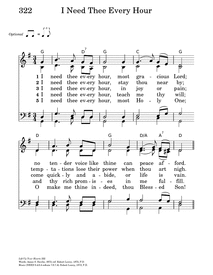
9) What feedback structures do you utilise in improving on your preaching?
We have a number of congregations at St Ebbe’s and a number of preachers, so we don’t always hear each other preaching live. The preachers meet once a month, having all listened, either at church or online, to a particular sermon by one of us. That individual is not present when we have our discussion of his sermon. Preachers are sensitive and are inclined to listen to every single comment that’s made, which can leave us overwhelmed with the number of things that we feel we ought to change. We found it more helpful to agree together on the positive things we want to feed back and also on one major area in which we think this sermon could have been improved. Because we listen to each other quite regularly, we are able to focus on areas to work on which are typical for that preacher. Having decided what we want to say, we then invite the preacher back in and give feedback. It sounds frightening, but it is a really helpful process and we all know that what is said has been carefully considered by a group of others and is not a maverick opinion of one.
10) What areas are you currently seeking to develop in your preaching?
There are so many different elements to a good sermon. Good understanding of the text in its context and a focus on its thrust are fundamental, but there is so much more to do: clarity of structure and expression; connection with people in head, heart and cultural context; concrete application to real life; as well as communication that exalts God and appeals to people to respond to him and his gospel in ways that are appropriate to the text. In any given moment I feel especially inadequate in at least one of these ways and try to give more attention to it, without losing the focus on correctly handling God’s word. I have recently been focusing on trying to think about how my preaching should differ depending on the genre of a passage. A sermon on The Song of Songs shouldn’t be exactly the same style as one on Ephesians.
11) What do you do on the days your preaching did not go very well?
There are times when I feel I need to be scraped off the floor after preaching because I have felt so inadequate. I try to encourage myself with the knowledge that this is God’s work and that the Holy Spirit graciously uses weak sermons. I have often been surprised how appreciative people have been about sermons that I have thought have been very bad, while those that seem from my perspective to go especially well appear to have no impact.
12) What one piece of advice would you pass on to someone starting out as a preacher?
Don’t get lost in the details.

Make sure you have a clear message – and work hard to ensure that it is the main message of the text. That thrust must come across, however long the sermon is and however many of the details you are able to expound as well. And the main thrust of the individual passage should always be preached in the light of the main thrust of the Bible as a whole. That will mean you always preach Christ and the gospel in every sermon, but in the rich variety of the Bible, rather than using the same old formula every time.
13) What are some of the best resources you have found on preaching?
Nothing has helped me more than Proclamation Trust preaching conferences. You may think that, as someone on the leadership team of PT, I would say that, but it’s genuinely true. They have not only helped me to have a deeper understanding of particular parts of the Bible, but also remind me of the importance of prioritising preaching and the need to keep working at it.
The Proclamation Trust runs 3 residential preaching conferences a year. Autumn Ministers’ Conference at the beginning of November and then Senior and Younger Ministers’ Conferences at the end of April and beginning of May. We would love to welcome you to one of these at Hothorpe Hall near Market Harborough. For more details please visit: https://www.proctrust.org.uk/conferences
———-
Vaughan has written a number of books, including God’s Big Picture, Battles Christians Face, True Friendship and, most recently, a series of three mini books addressing topical issues: Assisted Suicide, Transgender and The Porn Problem. In his spare time, Vaughan enjoys playing tennis and golf.
Proclaimer Blog
Wednesday is for Women’s Ministry (Part 2)

Carrie Sandom is the Director of Women’s Ministry at The Proclamation Trust. I asked her a few questions about Women’s Ministry.
Here is part 2 of our 4 part series, Wednesday is for Women’s Ministry.
Why should the church invest in Women’s Ministry?
They should invest in women’s ministry because un-taught and un-discipled women malign God’s Word (Titus 2:5). Paul is clear that while Titus and the teaching elders in Crete have an important role in teaching sound doctrine and refuting error, the younger women need to be taught and trained by godly older women as well. It’s not that they are needed to teach different things but they can model what it means to be a godly woman in ways the male teaching elders can’t. Teaching and training, mentoring and modelling are important aspects of effective discipleship – and men and women are needed to do them. We’re teaching the same things but sometimes they need to be modelled in different ways.
When should a church employ a Women’s Worker?
Whenever the resources are available to do so – although it doesn’t need to be a full time role in the first instance. One minister used to say that he would always employ a women’s worker before a youth or children’s worker because the investment made with the women would bear longer-term fruit – and impact the youth and children’s ministries as a result. It’s the parents who have the main responsibility for teaching their children so setting up discipleship programmes with them is the priority. Teach a mum how to study the Bible and she will teach it to her children – and demonstrate good parenting priorities as well.

What can a church do to enhance Women’s Ministry even if they do not have capacity to bring someone onto the staff team for this particular role?
Encourage women in their church to start women’s ministry – either by studying the Bible one to one or in small groups. Many churches have these already. If I was starting from scratch I would look for the women who are already serving in some way – either in the Sunday school or the youth group and so some sessions on leading better Bible studies or how to read the Bible one to one with someone. That said, the best way for women to learn is to experience a one to one or a good group study – so that may mean doing it with them for a term or two before letting them have a go with others.

What steps could be taken in a church where Women’s Ministry is stuck in a rut running studies about women in the Bible?
Hmm – I’ve come across ministries like this in other countries but hopefully we’ve moved on from this in the UK! Women’s ministry is not about being a woman! It’s about teaching the Bible to women and they need to hear the whole counsel of God. In our women’s Bible studies at St John’s we study a variety if different Biblical genres and seek to apply them in appropriate ways given the roles we have as women in the work place, in the home in our evangelism and so forth.
